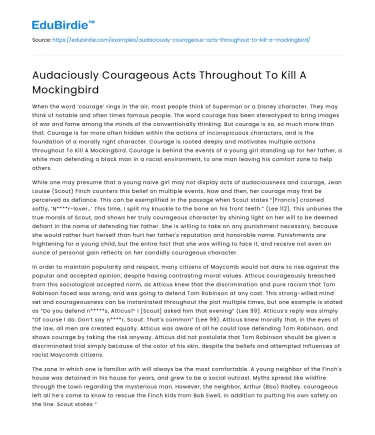When the word ‘courage’ rings in the air, most people think of Superman or a Disney character. They may think of notable and often times famous people. The word courage has been stereotyped to bring images of war and fame among the minds of the conventionally thinking. But courage is so, so much more than that. Courage is far more often hidden within the actions of inconspicuous characters, and is the foundation of a morally right character. Courage is rooted deeply and motivates multiple actions throughout To Kill A Mockingbird. Courage is behind the events of a young girl standing up for her father, a white man defending a black man in a racist environment, to one man leaving his comfort zone to help others.
While one may presume that a young naive girl may not display acts of audaciousness and courage, Jean Louise (Scout) Finch counters this belief on multiple events. Now and then, her courage may first be perceived as defiance. This can be exemplified in the passage when Scout states “[Francis] crooned softly, ‘N****r-lover…’ This time, I split my knuckle to the bone on his front teeth.” (Lee 112). This unburies the true morals of Scout, and shows her truly courageous character by shining light on her will to be deemed defiant in the name of defending her father. She is willing to take on any punishment necessary, because she would rather hurt herself than hurt her father's reputation and honorable name. Punishments are frightening for a young child, but the entire fact that she was willing to face it, and receive not even an ounce of personal gain reflects on her candidly courageous character.
Save your time!
We can take care of your essay
- Proper editing and formatting
- Free revision, title page, and bibliography
- Flexible prices and money-back guarantee
In order to maintain popularity and respect, many citizens of Maycomb would not dare to rise against the popular and accepted opinion, despite having contrasting moral values. Atticus courageously breached from this sociological accepted norm, as Atticus knew that the discrimination and pure racism that Tom Robinson faced was wrong, and was going to defend Tom Robinson at any cost. This strong-willed mind set and courageousness can be instantiated throughout the plot multiple times, but one example is stated as “Do you defend n*****s, Atticus?’ I [Scout] asked him that evening” (Lee 99). Atticus’s reply was simply “Of course I do. Don’t say n****r, Scout. That’s common” (Lee 99). Atticus knew morally that, in the eyes of the law, all men are created equally. Atticus was aware of all he could lose defending Tom Robinson, and shows courage by taking the risk anyway. Atticus did not postulate that Tom Robinson should be given a discriminated trial simply because of the color of his skin, despite the beliefs and attempted influences of racist Maycomb citizens.
The zone in which one is familiar with will always be the most comfortable. A young neighbor of the Finch's house was detained in his house for years, and grew to be a social outcast. Myths spread like wildfire through the town regarding the mysterious man. However, the neighbor, Arthur (Boo) Radley, courageous left all he’s come to know to rescue the Finch kids from Bob Ewell, in addition to putting his own safety on the line. Scout states “...Mr.Ewell was tryin’ to squeeze me to death, I reckon...then somebody yanked Mr.Ewell down” (Lee, 361), to which Mr. Tate inquired “Who was it?” (Lee 362). Scout goes on to say “Why there he is, Mr. Tate, he can tell you his name” (Lee, 362). Scout provides a physical description of the figure before stating “our neighbor’s image blurred with my sudden tears. ‘Hey Boo,’ I said” (Lee 362). These excerpts from the passage show that it was Arthur Radley who saved the Finch children that day, and it was Arthur Radley who left his comfort zone and risk his personal safety. This displays true courageousness by the risk and unfamiliar scenario Boo threw himself in to save the children.
In conclusion, courageousness motivates many major events throughout To Kill A Mockingbird. Courage can define and show aspects of a character that may have been overlooked, or otherwise unperceived. Without a shadow of a doubt, traits of courageousness and intrepidity were exhibited by the actions of Jean Louise Finch, Atticus Finch and Arthur (Boo) Radley, alongside many other characters in To Kill A Mockingbird. Courage made the events of a young girl standing up for her father, a white man defending a black man in a racist environment, to one man leaving his comfort zone to help others possible.






 Stuck on your essay?
Stuck on your essay?

